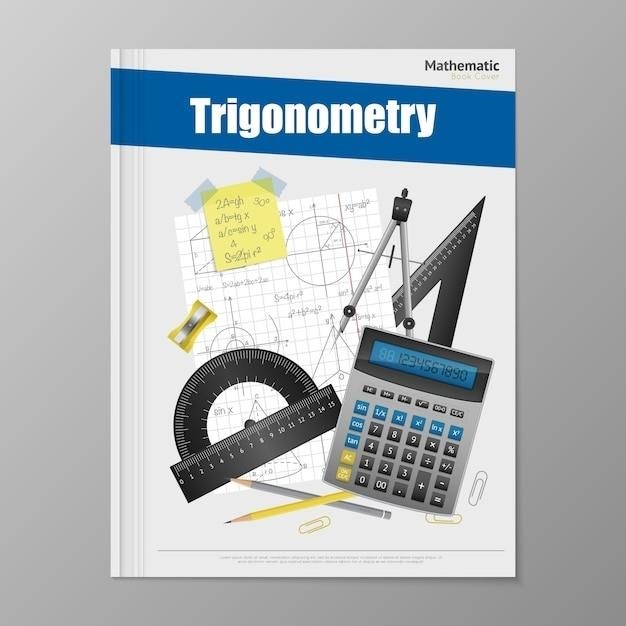Algebra One Textbook PDF⁚ A Comprehensive Guide
This guide explores the benefits and challenges of using Algebra One textbooks in PDF format. We’ll cover finding reliable sources‚ assessing PDF quality‚ and understanding copyright implications for effective learning.
Finding Reputable Sources
Locating trustworthy sources for Algebra One textbook PDFs requires careful consideration. Avoid websites offering free downloads of copyrighted material‚ as this often violates copyright laws and may expose your device to malware. Reputable sources include educational platforms offering licensed digital textbooks‚ sometimes through subscription services. Check reviews and ratings before committing to a purchase. Libraries often provide access to digital textbooks; check your local library’s online resources or explore online library databases for access. Consider the publisher’s reputation; established educational publishers are more likely to offer high-quality‚ accurate content. Look for PDFs that clearly state licensing information‚ indicating legitimate access. Be cautious of sites offering “free” downloads without clear licensing‚ as these may be illegal copies. If you find a potential source‚ investigate its legitimacy thoroughly. Examine the website for professionalism and contact information. A reliable source will provide clear contact details and have a consistent online presence. Remember‚ investing in a legitimate PDF ensures access to accurate information and avoids legal complications. Prioritize sources with transparent licensing agreements‚ supporting ethical and legal access to educational materials.
Evaluating PDF Quality and Legality
Before using any Algebra One PDF textbook‚ carefully assess its quality and legality. Check for clear‚ legible text and well-structured diagrams; blurry images or inconsistent formatting suggest a low-quality scan or unauthorized copy. Examine the PDF’s metadata for clues about its origin and licensing. Legitimate PDFs usually have information about the publisher‚ copyright holder‚ and licensing terms. A lack of this information is a significant red flag. Compare the PDF’s content to a known legitimate version of the textbook if possible; discrepancies might indicate an incomplete or altered version. Beware of PDFs that are significantly smaller in file size than the original; this often indicates a compressed or inferior copy. Ensure the PDF is searchable; a lack of searchability makes it difficult to use effectively. A high-quality PDF will have properly functioning hyperlinks and bookmarks‚ allowing for easy navigation. If you’re unsure about the legality‚ contact the publisher directly to confirm whether the PDF is a legitimate copy. Downloading and using illegally obtained PDFs is a copyright infringement; always prioritize using legally sourced materials. Remember‚ using a low-quality or illegal PDF can hinder your learning and could have legal ramifications. A high-quality‚ legitimate PDF will enhance your learning experience.
Understanding Copyright Issues
Copyright law protects the intellectual property of authors and publishers. Downloading or sharing copyrighted Algebra One textbooks in PDF format without permission is illegal. Publishers hold the exclusive rights to reproduce‚ distribute‚ and create derivative works from their textbooks. Unauthorized distribution of PDFs infringes upon these rights and can result in severe consequences‚ including legal action and financial penalties. Even sharing a PDF with a friend or classmate is a violation of copyright. While some educational institutions may provide authorized access to digital textbooks‚ this access is often limited to students enrolled in specific courses. Always check with your institution or the publisher regarding authorized access to digital materials. Remember that using a pirated PDF not only harms the creators but also deprives them of the income necessary to continue producing educational resources. Respecting copyright is crucial for supporting the creation of high-quality educational materials and maintaining a fair and ethical environment for learning. Obtaining legally licensed digital textbooks ensures you have access to the complete and accurate material and protects you from legal repercussions. Choose legitimate sources and abide by copyright regulations for a responsible and ethical approach to your education.

Key Features to Look For in a PDF Textbook
A high-quality Algebra One PDF should offer clear explanations‚ numerous practice problems‚ interactive elements (if available)‚ and a comprehensive index for easy navigation.
Clear Explanations and Examples
When evaluating an Algebra One PDF textbook‚ the clarity of explanations and the quality of examples are paramount. Look for textbooks that break down complex concepts into easily digestible steps. Avoid PDFs that jump into advanced topics without sufficient foundational knowledge. Effective explanations should use precise mathematical language‚ yet remain accessible to students with varying learning styles. The use of visual aids‚ such as diagrams‚ graphs‚ and charts‚ can significantly enhance understanding. These visuals should be well-integrated into the text‚ not merely decorative additions. Furthermore‚ the examples provided should be diverse and relevant‚ illustrating the application of concepts in various contexts. Each example should ideally include a detailed step-by-step solution‚ allowing students to follow the reasoning process. The presence of multiple examples for each concept further strengthens the learning experience‚ providing students with opportunities to practice problem-solving strategies and solidify their understanding. A well-structured PDF will clearly distinguish between examples and practice problems‚ offering a clear pathway for self-guided learning.
Interactive Exercises and Practice Problems
A high-quality Algebra One PDF textbook should include a robust selection of interactive exercises and practice problems. These shouldn’t be mere supplementary materials; they should be integral to the learning process. The exercises should be varied in difficulty‚ progressing gradually from easier problems to more challenging ones. This allows students to build confidence and master the concepts incrementally. Ideally‚ the PDF should offer immediate feedback on the answers‚ allowing students to identify and correct their mistakes promptly. This self-assessment feature is crucial for independent learning. The inclusion of different problem types‚ such as multiple-choice‚ fill-in-the-blank‚ and free-response questions‚ caters to various learning preferences and strengthens comprehension. Furthermore‚ the availability of worked solutions for selected problems provides invaluable support for students who are struggling. The textbook should clearly indicate the difficulty level of each problem‚ enabling students to tailor their practice sessions to their current understanding. A well-designed set of practice problems helps students to not just memorize formulas‚ but to truly understand the underlying principles of Algebra One.
Comprehensive Index and Glossary
A well-structured Algebra One PDF textbook should include a detailed index and a comprehensive glossary to aid navigation and understanding. The index should be meticulously organized‚ allowing for quick and easy location of specific topics‚ formulas‚ and examples. Each entry should be precise and cross-referenced where appropriate‚ ensuring that students can readily find the relevant information regardless of how it’s presented within the text. The use of clear and consistent terminology throughout the index is essential for effective searching. The glossary should provide concise‚ yet informative‚ definitions of all key algebraic terms and concepts used in the textbook. Each definition should be clear‚ accurate‚ and accessible to students with varying levels of mathematical background. The glossary should not just define terms; it should also provide context and illustrate their usage within the framework of Algebra One. Including illustrative examples alongside definitions can significantly enhance understanding. Both the index and glossary should be easily accessible‚ perhaps through hyperlinks or a searchable function within the PDF‚ to promote efficient learning and quick reference. A well-designed index and glossary are vital tools for effective self-study and independent learning.

Utilizing Your Algebra One PDF Textbook Effectively
Mastering Algebra requires a strategic approach. This section offers tips for effective use of your PDF textbook‚ maximizing its educational potential for optimal learning outcomes.
Creating a Study Schedule
Developing a structured study schedule is crucial for success in Algebra. Begin by assessing your current workload and available study time. Create a realistic timetable‚ allocating specific days and times for reviewing concepts‚ completing practice problems‚ and addressing any areas where you’re struggling. Consider breaking down larger study sessions into smaller‚ more manageable chunks to prevent burnout and maintain focus. Regular‚ shorter study sessions are often more effective than infrequent‚ lengthy ones. Integrate your Algebra study schedule with your other academic commitments and extracurricular activities to ensure a balanced approach. Remember to include regular breaks to avoid mental fatigue. Use a planner‚ calendar‚ or app to track your progress and stay organized. Be flexible and adjust your schedule as needed based on your learning progress and any unforeseen circumstances. Consistent effort and adherence to a well-structured plan are key to mastering the subject. Don’t hesitate to review and refine your study schedule periodically to ensure it remains effective and supportive of your learning needs. Remember‚ consistency is key to success in algebra‚ and a well-planned study schedule contributes significantly to that consistency.
Utilizing Online Resources for Support
The internet offers a wealth of supplementary resources to enhance your Algebra One learning experience. Explore reputable educational websites like Khan Academy‚ which provide video tutorials‚ practice exercises‚ and interactive lessons aligned with Algebra One curricula. These platforms often offer detailed explanations of concepts‚ making complex topics more accessible. Utilize online forums and communities dedicated to mathematics; these spaces provide opportunities to connect with peers and instructors‚ ask questions‚ and receive support from a broader learning community. Many online resources offer step-by-step solutions to practice problems‚ allowing you to check your work and identify areas needing further attention. Remember to critically evaluate the credibility of online sources before relying on them. Look for resources created by qualified educators or reputable institutions. Supplementing your textbook with online resources can provide a more comprehensive and engaging learning experience‚ making the learning process more effective and enjoyable. By strategically utilizing these online resources‚ you can build a stronger foundation in algebra and improve your overall understanding of the subject matter.
Seeking Help When Needed
Don’t hesitate to seek assistance when facing challenges in Algebra One. Your teacher or professor is your primary resource; they can provide personalized guidance‚ clarify confusing concepts‚ and offer additional support tailored to your specific needs. Many schools offer tutoring services‚ either through individual sessions with tutors or group study sessions with peers. These settings provide opportunities to ask questions in a supportive environment and collaborate with others facing similar challenges. Online tutoring platforms offer another avenue for support; these platforms often connect students with qualified tutors who can provide real-time assistance. Remember that seeking help is a sign of strength‚ not weakness. Overcoming obstacles in mathematics often requires collaboration and support‚ and actively seeking assistance can significantly improve your understanding and academic performance. Don’t be afraid to reach out to your teacher‚ attend tutoring sessions‚ or utilize online resources to overcome any difficulties you encounter. Proactive help-seeking contributes to a more successful and rewarding learning experience.
